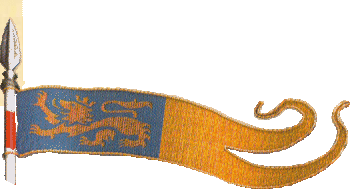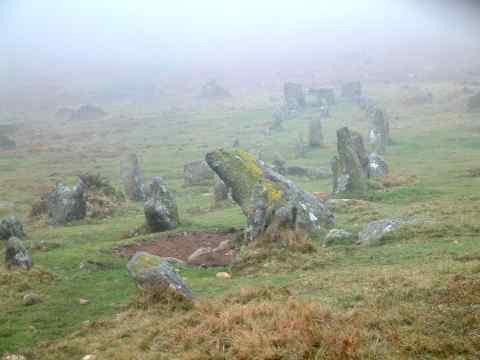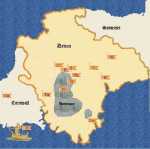
Devon in the Fourteenth Century
The question I have been asked most often is "why write about the 14th century?", and it seems to me that the best answer is to read my books because they show just why I had to choose this period.
Everything was changing, and that's something that authors are always looking for. The more disruption the better, from a novelist's point of view!
So what was happening? Well, for a start, at the beginning of the century the whole of Christianity was reeling from the disaster of losing the Crusader kingdoms. Jerusalem and the city-states had fallen in the space of a few months, overrun by the terrible might of the Egyptian Mameluke hordes. It made Christians wonder whether God had turned His face from them.
The 14th century was to reinforce that.
On 13th October 1307, the most honourable, loyal Christians, the Knights Templar, were swept up, arrested and tortured. We can't imagine anything so terrible now. At the time this was a cataclysmic event. All the most highly respected warriors in a society based upon courage, chivalry and religion were accused of sodomy, murder, cannibalism, and many other trumped-up charges from the over-imaginative agents of the Pope and the French King. They wanted the Templars' wealth.
After this, Europe suffered from colder winters, and then appallingly wet summers. From 1315 to 1321 the harvests suffered. Famine caused starvation everywhere, and there were rumours of cannibalism all over the continent. This was a terrible disaster - in England alone, between 10 and 15 per cent of the population died. Hanged men, allegedly, were hauled down and hacked apart for food in Poland.
Not only humans suffered. There were great murrains, or diseases, of sheep and cattle, which meant that the animals all died, adding to the misery of the starving people. England suffered more than most because at the same time the kingdom was riven by war. The weak and rather pathetic King Edward II couldn't keep his lords from bickering and fighting, and there were regular civil wars. His advisors were corrupt and greedy to a level astonishing to consider now. There was the dreadful Piers Gaveston, son of an unknown knight, who became Earl of Cornwall before being captured and executed. He was followed by the still worse Despensers. Once they were destroyed, it was too late for poor Edward, who was forced to abdicate, and then murdered.
Fortunately Edward III soon managed to reach the throne, over the bloody body of his mother's lover, and the kingdom was almost stable. Until Edward launched his army against France, beginning the Hundred Years War. This would be much like Mexico trying to invade the USA today. France was the known world's foremost power, and when the English began to win battles, the rest of Europe stared on in astonishment.
And then, just before the half-century, Europe suffered the worst catastrophe ever. The Black Death struck.
How could a novelist not want to write about a time like this?
But with all the hideous disasters in France, on battlefields up and down England, why on earth would a novelist pick a place like Devonshire to write about?
England at this time was growing into a nation. For the first time, French stopped being used as the language of the nobility. Gradually it lost its hold over the English, so that Chaucer (c.1342 - 1400) would choose to use English, not French, for his texts. This was an exciting time.
Yet many people have written about large cities. If you want to find out about the rich and famous, there are many books about them. I didn't want to write about them; I wanted to show how the ordinary people lived. How would the peasants in the wastelands survive, trying to eke a living out far from the nearest town? How would the farmers live, while still being legally owned by the lord of their manor? How would the manorial lord himself exist far from the supposed benefits of civilisation?
To write a book that would show the variety of experience of the ordinary people, I had to get away from London or York. I had to look for a place which showed me, as well as readers, how barren and cruel the landscape was, which allowed me to immerse myself in the sense of history. And for that, I knew of only one place, Dartmoor.

Dartmoor: a place full of stories
It is a landscape which has changed over the centuries. Like all England, it has been worked more or less continually over the years, and yet there is an unchanging feel to the place. You can stand on a hill or in a valley and see no sign of twenty-first century life. You can hear only the wind howling in your ears, you can feel only the fine droplets of dampness striking your face. And see no one else in a day.
And although that made me pick Dartmoor, it also gave me a range of plots. Most of the books set in Dartmoor have their creation in historical fact or local legend. Also, because Dartmoor was the possession of the Earl of Cornwall and thus was early on given to Piers Gaveston before being passed to others, the moors gave me a link with national preoccupations.
Dartmoor has itself given me stories, and all I have had to do is translate them for modern readers. My readers can go to the places about which I write, and see the land much as Baldwin or Simon would have seen it.
But most of all, Dartmoor has given me a home, and the people have made my family welcome here, and for that especially I am enormously grateful.
Website designed and maintained by Cornwell Internet
Photo © Michael Jecks, 2005
Last update: 7th February 2007

